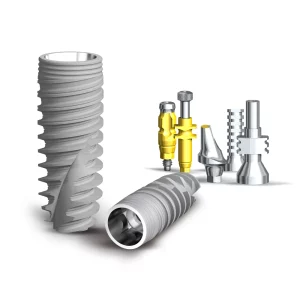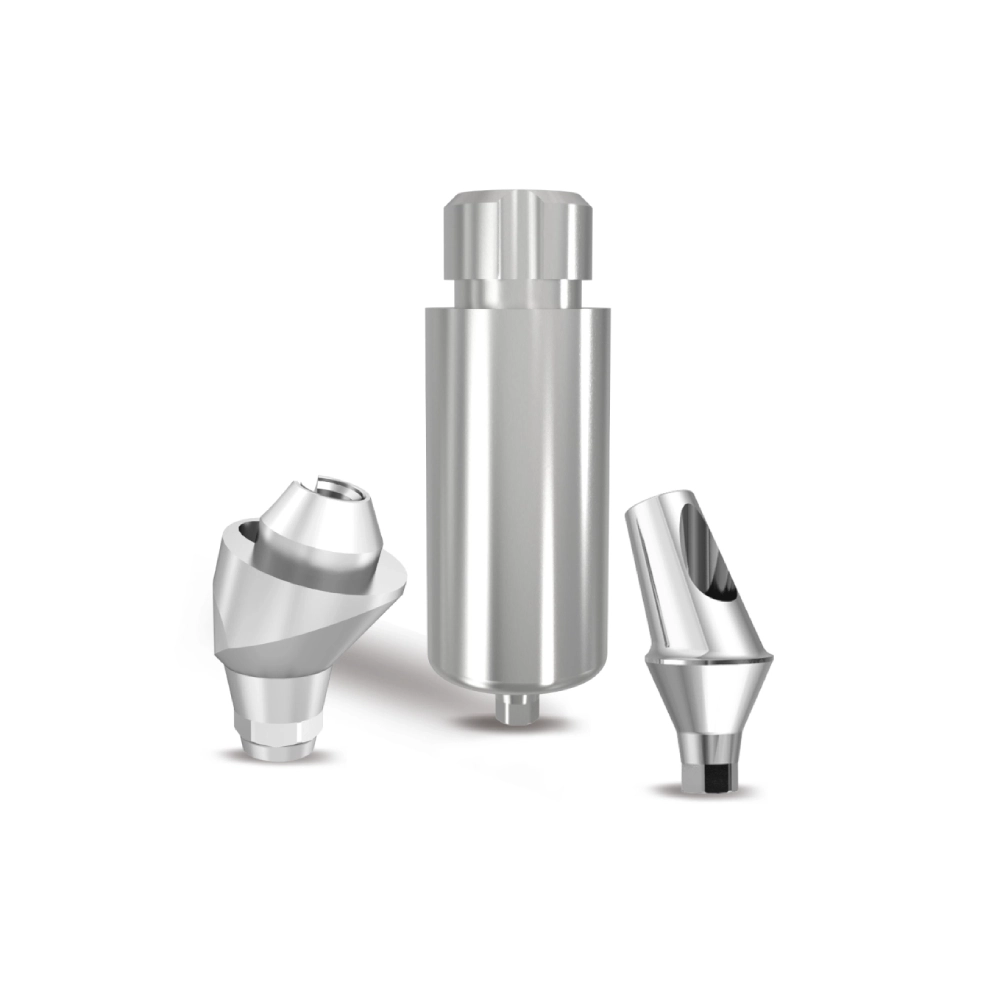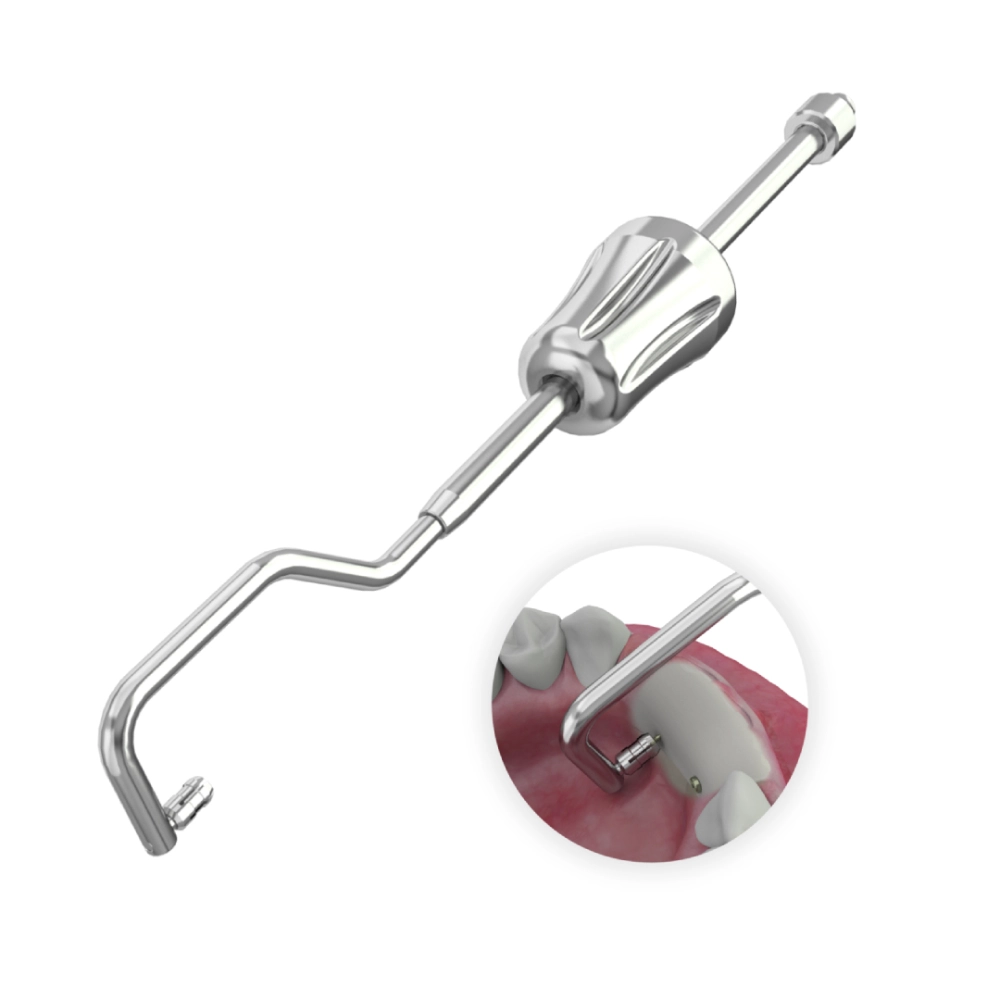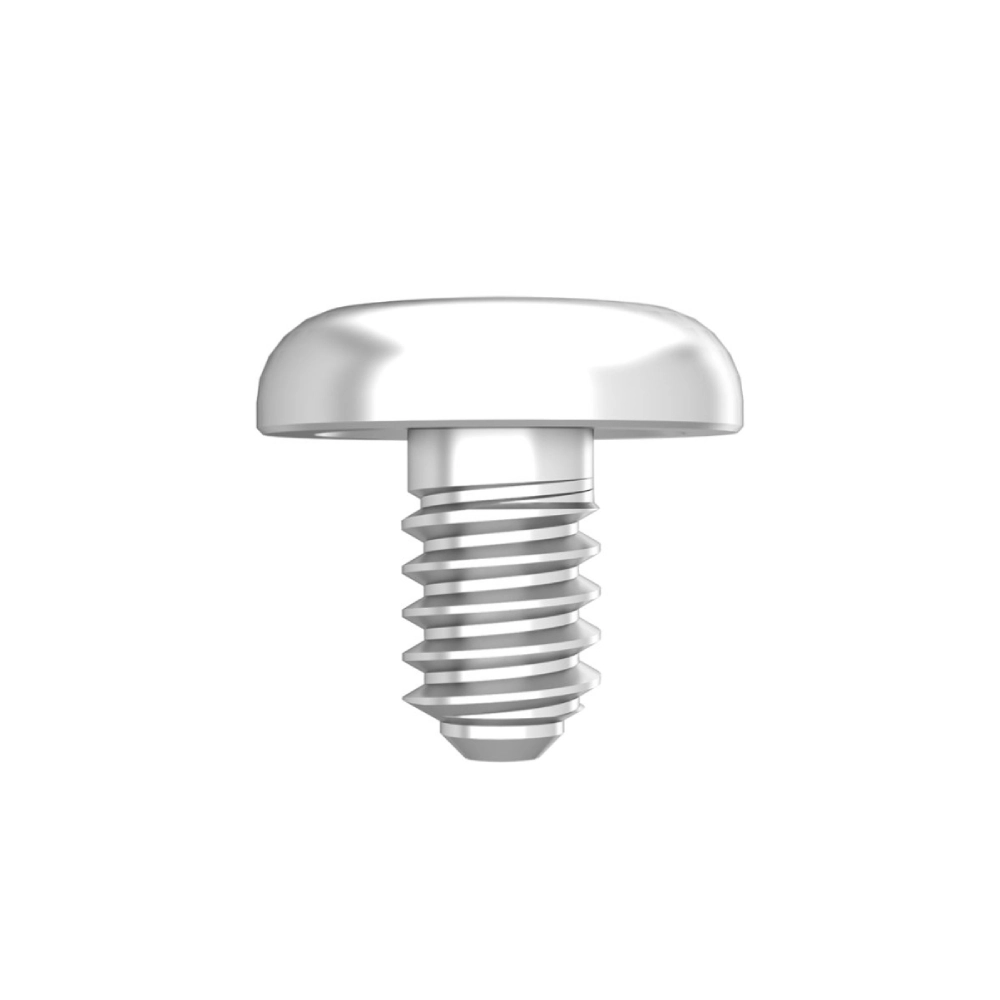Zahnimplantate sind zu einer der beliebtesten Behandlungsoptionen für die Wiederherstellung fehlender Zähne geworden, nicht nur, weil sie eine Vielzahl von Behandlungsmöglichkeiten bieten, sondern auch wegen ihrer unübertroffenen Vorteile bei der Wiederherstellung des eigenen Lächelns. Egal, ob es sich um den Verlust eines einzelnen Zahns oder mehrerer Zähne handelt, Zahnimplantate dienen als idealer Ersatz und bieten ein Aussehen, ein Gefühl und eine Funktion, die den natürlichen Zähnen sehr ähnlich sind. Darüber hinaus können moderne Zahnimplantate die Wurzelstruktur natürlicher Zähne wirksam nachahmen und so dazu beitragen, die Stabilität und Gesundheit des Kieferknochens des Patienten zu erhalten.
Was ist ein Zahnimplantat?
Zahnimplantate sind eine moderne und fortschrittliche Methode zur Zahnrestauration, bei der eine hergestellte Zahnwurzel (Implantat) als Träger für eine Krone verwendet wird, die die Ästhetik, das Gefühl und die Kaufunktion fehlender Zähne wiederherstellt. Das Verfahren beginnt mit dem präzisen Einsetzen des Implantats in den Kieferknochen, gefolgt von einer Einheilphase, die eine sichere Verbindung mit dem Kieferknochen ermöglicht (Osseointegration genannt). Anschließend wird ein Gingivaformer oder Übertragungspfosten auf dem Implantat befestigt, um einen präzisen Abdruck zu nehmen, der für die Herstellung und Anbringung einer individuellen Krone verwendet wird. Material, Form, Größe und Farbe der Krone werden sorgfältig auf die speziellen Bedürfnisse des Patienten abgestimmt und fügen sich natürlich in die benachbarten Zähne ein, um ein natürliches und ästhetisches Ergebnis zu gewährleisten. Zahnimplantate bieten nicht nur eine außergewöhnliche Stabilität und Haltbarkeit, sondern verhindern auch wirksam den Abbau des Kieferknochens und schützen die umliegenden Zähne, so dass sie den natürlichen Zähnen am nächsten kommen.
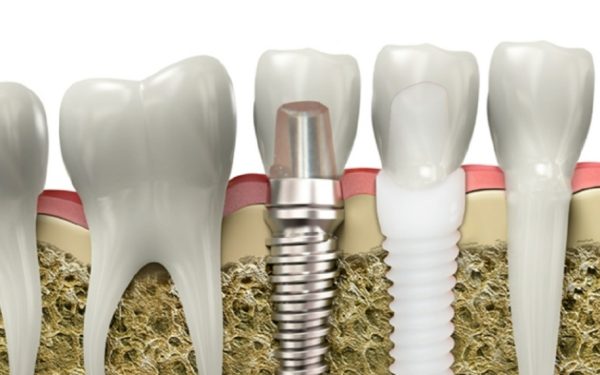
Was sind die verschiedenen Arten von Zahnimplantaten?
1. Titan-Implantate
Als herausragende Vertreter der modernen Zahnersatztechnologie haben sich Titanimplantate aufgrund ihrer Haltbarkeit und Langlebigkeit in der Zahnmedizin einen Namen gemacht. Titan ist ein Metall mit außergewöhnlicher Festigkeit und Stabilität, das in der Lage ist, den komplexen und wechselnden Kräften im Mund zu widerstehen und so die langfristige Stabilität des Implantats zu gewährleisten. Darüber hinaus weist Titan eine ausgezeichnete Korrosionsbeständigkeit auf, die von der sauren oder alkalischen Umgebung in der Mundhöhle nicht beeinträchtigt wird, was die Haltbarkeit des Implantats gewährleistet.
Noch wichtiger ist, Titan-Implantate weisen eine bemerkenswerte Biokompatibilität auf. Das bedeutet, dass sie sich nach der Implantation in den Körper gut in das umliegende Gewebe integrieren und das Risiko einer Abstoßung oder Entzündung minimieren. Dank dieser Eigenschaft fügen sich Titanimplantate nahtlos in das körpereigene Gewebe ein und bieten den Patienten einen Komfort und eine funktionelle Erfahrung, die den natürlichen Zähnen ähneln. Für Patienten, die auf der Suche nach einer zuverlässigen und langlebigen Lösung für die orale Versorgung sind, sind Titanimplantate eine ideale Wahl. Sie stellen nicht nur die Kaufunktion wieder her, sondern verbessern auch wirksam die Mundgesundheit und damit die Lebensqualität insgesamt.
Vorteile und Anwendungen von Titanimplantaten
Die Vorteile von Titanimplantaten liegen nicht nur in ihren physikalischen und chemischen Eigenschaften, sondern auch in ihrer breiten klinischen Anwendung und ihren beeindruckenden Ergebnissen. Erstens eignen sich Titanimplantate für verschiedene Arten von Zahnverlust, ob es sich nun um den Verlust eines einzelnen Zahns oder mehrerer aufeinanderfolgender Zähne handelt, die alle mit Titanimplantaten wiederhergestellt werden können. Zweitens ist der chirurgische Prozess für Titanimplantate relativ einfach, minimalinvasiv und bietet eine schnelle Genesung, was die Beschwerden und Unannehmlichkeiten für den Patienten erheblich reduziert. Darüber hinaus zeichnen sich Titanimplantate durch eine hohe Erfolgsquote und eine ausgezeichnete Stabilität aus, so dass die Patienten langfristig stabile Ergebnisse bei der Zahnrestauration erhalten.
Im zahnmedizinischen Bereich sind Titanimplantate zu einer unverzichtbaren Methode der Versorgung geworden. Sie erfüllen nicht nur die Bedürfnisse der Patienten nach Ästhetik, Komfort und Funktionalität, sondern beugen auch wirksam Mundkrankheiten vor und schützen die Mundgesundheit. Mit den Fortschritten in der Zahnmedizin wird erwartet, dass Titanimplantate in Zukunft eine noch wichtigere Rolle bei der Zahnrestauration spielen und mehr Patienten ein gesundes und schönes Lächeln bescheren werden.
2. Zirkoniumdioxid-Implantate
Zirkoniumdioxid-Implantate, ein aufstrebender Stern am Himmel der Zahnrestauration, erfreuen sich aufgrund ihrer einzigartigen Attraktivität und ihrer bedeutenden Vorteile zunehmender Beliebtheit. Dieses Material ist nicht nur stark und haltbar und kann verschiedenen mechanischen Herausforderungen in der Mundhöhle standhalten, sondern weist auch eine hervorragende Biokompatibilität auf, so dass es sich gut mit dem umliegenden Gewebe verbinden kann. Dies gewährleistet die langfristige Stabilität des Implantats und erhält die Mundgesundheit des Patienten.
Ein besonders erwähnenswerter Aspekt ist, dass Zirkoniumdioxid-Implantate besonders für Patienten geeignet sind, die allergisch auf Metalle reagieren, an Autoimmunerkrankungen leiden oder Bedenken wegen der Sichtbarkeit von Titanimplantaten unterhalb des Zahnfleischsaums haben. Für Patienten, die allergisch auf Metallmaterialien reagieren, sind Zirkoniumdioxid-Implantate zweifellos die sicherere Wahl, da sie allergische Reaktionen verhindern und den Patienten unnötige Unannehmlichkeiten ersparen. Für Patienten, die Wert auf Ästhetik und Mundgesundheit legen, sind Zirkonoxid-Implantate durch ihr natürliches, lichtdurchlässiges Aussehen und ihre hohe ästhetische Qualität den natürlichen Zähnen sehr ähnlich und verleihen ihrem Lächeln Glanz und Selbstvertrauen.
Es ist jedoch wichtig zu wissen, dass Zirkoniumdioxidimplantate zwar zahlreiche Vorteile bieten, aber tendenziell teurer sind als Titanimplantate. Dies ist in erster Linie auf die Knappheit von Zirkoniumdioxid und die Komplexität seiner Herstellung zurückzuführen. Da Zirkoniumdioxid außerdem einen geringeren Elastizitätsmodul hat, kann es in bestimmten Fällen bei übermäßigen Bisskräften leichter brechen. Daher sollten Patienten, die Zirkonoxidimplantate in Erwägung ziehen, ihren Mundzustand und ihre finanzielle Situation sorgfältig prüfen und eine fundierte Entscheidung unter Anleitung eines Zahnarztes treffen.
3. Implantatgetragene Zahnbrücke
Eine implantatgetragene Zahnbrücke ist eine restaurative Lösung, die speziell dafür entwickelt wurde, mehrere fehlende Zähne in einer Reihe zu ersetzen. Sie nutzt einige Zahnimplantate, um die gesamte Brücke sicher zu stützen und so die Funktion und das Aussehen der Zähne wiederherzustellen.
Das Prinzip einer implantatgetragenen Zahnbrücke besteht darin, Zahnimplantate auf beiden Seiten oder an den entsprechenden Positionen der fehlenden Zähne einzusetzen. Diese Implantate fungieren als stabile "Pfeiler", die Halt bieten. Anschließend wird ein zusammenhängender Satz künstlicher Zähne, die so genannte "Brücke", auf den Implantaten befestigt, um die durch die fehlenden Zähne entstandene Lücke zu überbrücken. Die Implantate gehen eine feste Verbindung mit dem Kieferknochen ein und bilden so ein starkes Fundament, das die gesamte Brücke im Mund stabil hält.
Insgesamt ist eine implantatgetragene Zahnbrücke eine effiziente, ästhetisch ansprechende und dauerhafte Lösung für Patienten, denen mehrere benachbarte Zähne fehlen. Da die gesamte Brücke von einigen wenigen Implantaten getragen wird, kann sie die Funktion und das Aussehen der Zähne wirksam wiederherstellen. Die Patienten müssen sich jedoch über ihren Mundzustand im Klaren sein und unter der Anleitung eines Zahnarztes eine fundierte Entscheidung treffen. Auch die Nachsorge nach dem Eingriff ist entscheidend, um die langfristige Stabilität der Implantate und die Gesundheit der Mundhöhle des Patienten zu gewährleisten.
4. All-On-4-Implantate
Das All-On-4-Implantat ist ein innovatives zahnmedizinisches Verfahren, mit dem das Problem des vollständigen Zahnverlusts gelöst werden soll. Traditionell erforderte die Befestigung von Vollprothesen komplexe Klammern oder Klebstoffe, die nicht nur den Patientenkomfort beeinträchtigten, sondern auch die Stabilität der Prothesen gefährdeten. Bei der 4-Implantat-Technik für den gesamten Zahnbogen werden jedoch nur vier Implantate strategisch platziert, um ein vollständiges Gebiss wirksam zu stützen und zu befestigen und eine effiziente orale Rekonstruktion zu erreichen.
Vier Implantate, sicherer Halt für Vollprothesen
Der Hauptvorteil der All-On-4-Implantatversorgung liegt in ihrem schlanken und effizienten Design. Bei dieser Technik werden vier sorgfältig platzierte Implantate verwendet, die in der Regel in den vorderen und hinteren Bereich des Ober- oder Unterkiefers eingesetzt werden und eine stabile Stützstruktur bilden. Diese Anordnung maximiert nicht nur die mechanischen Prinzipien des Mundes, sondern gewährleistet auch eine starke Integration zwischen den Implantaten und dem umgebenden Knochengewebe. Dadurch bietet die All-On-4-Implantatversorgung eine hervorragende Stabilität, die dafür sorgt, dass die Vollprothese auch bei alltäglichen Aktivitäten wie Kauen und Sprechen fest im Mund verbleibt, ohne dass die Gefahr besteht, dass sie sich lockert oder herausfällt.
Darüber hinaus ist die All-On-4-Implantattechnik bekannt für ihr minimales chirurgisches Trauma, die schnelle Heilung, die hohen Erfolgsraten und die einfache Pflege. Dieser Ansatz verbessert nicht nur die Lebensqualität des Patienten, sondern führt auch zu einer natürlicheren und ästhetisch ansprechenderen Versorgung. Daher sind All-On-4-Implantate für viele Patienten mit vollständigem Zahnverlust die bevorzugte Wahl, um ihnen zu einem gesunden und schönen Lächeln zu verhelfen.

Wie Sie das beste Verfahren für Zahnimplantate für sich selbst auswählen
Einzelzahn
Wenn ein einzelner Zahn fehlt, kann er durch ein Zahnimplantat ersetzt werden. Dazu wird ein Pfosten (das Implantat) in den Kieferknochen eingesetzt und eine dauerhafte Krone darauf befestigt. Das gesamte Verfahren ist schmerzfrei, kann aber bis zu vier Monate dauern, bis die Krone aufgesetzt ist und die Zahnstruktur wiederhergestellt ist. Wenn ein Patient einen einzelnen Zahn verliert, wird ein einzelnes Zahnkronenimplantat für einen Eins-zu-eins-Ersatz verwendet.
Implantatbrücke mit mehreren Zähnen
Bei mehreren fehlenden Zähnen ist eine implantatgetragene Brücke oft die beste Lösung. Eine Reihe von Zahnimplantaten wird durch eine Brücke aus Kronen verbunden, um die fehlenden Zähne zu ersetzen. Wenn jedoch die Lücke zwischen den fehlenden Zähnen groß ist oder die Stabilität im Mund beeinträchtigt ist, kann eine implantatgetragene prothetische Brücke erforderlich sein, um mehrere aufeinanderfolgende fehlende Zähne zu ersetzen. Traditionell werden diese Brücken durch Kronen gestützt, die die benachbarten Zähne in der Nähe der fehlenden Zähne abdecken oder mit Drähten und Zahnklebern befestigt werden.
Implantatgetragener Zahnersatz
Implantatgetragener Zahnersatz ist eine fortschrittliche Lösung für Patienten, denen alle oder mehrere Zähne fehlen. Durch die strategische Platzierung von vier bis sechs Zahnimplantaten kann der gesamte Zahnbogen effektiv rekonstruiert werden. Diese implantatgetragenen Prothesen können dauerhaft auf den Implantaten befestigt werden, lassen sich aber auch leicht mit Hilfe eines Zahnarztes zur routinemäßigen Wartung und Reinigung herausnehmen.
Dank des rasanten Fortschritts in der modernen Kieferchirurgie können wir heute Zahnprothesen so anpassen, dass sie den einzigartigen Konturen des Kiefers und des Zahnfleischs eines Patienten entsprechen. Diese Prothesen können mit verschiedenen Arten von Zahnimplantaten mit dem Kieferknochen verbunden werden und bieten so maßgeschneiderte Lösungen für die individuellen Bedürfnisse. Das individuelle Design gewährleistet nicht nur die funktionelle Leistung, sondern erfüllt auch ästhetische Anforderungen. Für Patienten, die derzeit herausnehmbare Prothesen tragen, bieten implantatgetragene Prothesen eine haltbarere und stabilere Lösung.
Sind Sie für eine Zahnimplantatoperation geeignet?
Um festzustellen, ob ein Patient für eine Zahnimplantatoperation geeignet ist, kann eine umfassende Bewertung unter folgenden Gesichtspunkten durchgeführt werden:
1. Parodontale Gesundheit Der Zahnhalteapparat ist ein wesentlicher Bestandteil der Zähne und besteht aus dem parodontalen Ligament, dem Zement, dem Alveolarknochen und dem Zahnfleisch. Gesunder Zahnhalteapparat ist in der Regel blassrosa und blutet nicht beim Zähneputzen. Wenn die parodontale Gesundheit des Patienten gut ist, ist er im Allgemeinen ein geeigneter Kandidat für Zahnimplantate. Leidet der Patient hingegen an einer schweren Parodontitis mit starkem Zahnfleischrückgang, kann eine Implantatbehandlung die lokale Reizung verschlimmern und das Risiko eines Misserfolgs der Operation erhöhen. Daher muss vor einer Implantatoperation unbedingt sichergestellt werden, dass eine Parodontitis wirksam behandelt und kontrolliert wird.
2. Zustand des Alveolarknochens Der Alveolarknochen umgibt und stützt die Zahnwurzeln und ist für die Implantatchirurgie unerlässlich. Er muss gesund und stabil genug sein, um das Implantat zu tragen. Bei starkem Knochenschwund oder Erkrankungen wie Osteoporose oder Knochensklerose kann sich das Implantat möglicherweise nicht gut integrieren und den neuen Zahn nicht tragen. In solchen Fällen kann eine Knochentransplantation oder eine andere Behandlung erforderlich sein, um die Knochenmasse zu erhöhen und die Wahrscheinlichkeit einer erfolgreichen Implantation zu verbessern.
3. Allgemeine Gesundheit Auch der allgemeine Gesundheitszustand des Patienten spielt bei der Zahnimplantationschirurgie eine wichtige Rolle. Wenn der Patient unter schwerem Bluthochdruck, Herzerkrankungen, Diabetes oder anderen systemischen Krankheiten leidet, die nicht gut eingestellt sind, kann eine Implantatoperation das Risiko von Komplikationen erhöhen. Daher ist vor der Implantatoperation eine umfassende körperliche Untersuchung erforderlich, um sicherzustellen, dass der Zustand des Patienten dem Eingriff standhalten kann.
4. Alter Faktoren Das Alter ist ein weiterer Faktor, der sich auf die Zahnimplantatoperation auswirkt. Im Allgemeinen werden Zahnimplantate bei jüngeren Patienten (z. B. bei Patienten unter 18 Jahren) nicht empfohlen, da ihre Kieferknochen möglicherweise noch nicht voll entwickelt sind. Ältere Patienten in gutem Gesundheitszustand und mit geeigneten Mundverhältnissen können sich jedoch ebenfalls einer Zahnimplantation unterziehen.
5. Lebensstil und Mundhygiene Auch der Lebensstil und die Mundhygiene können die Erfolgsrate der Implantatoperation beeinflussen. Ungesunde Gewohnheiten wie Rauchen oder übermäßiger Alkoholkonsum können sich negativ auf die Mundgesundheit auswirken und die Erfolgsrate der Implantatoperation verringern. Daher sollten Patienten vor einer Implantatoperation diese Gewohnheiten ändern und eine gute Mundhygiene betreiben.
Schlussfolgerung
Zahnimplantate sind eine beliebte Behandlungsoption zur Wiederherstellung fehlender Zähne und bieten eine Vielzahl von Behandlungsmöglichkeiten und Vorteilen für die Wiederherstellung des Lächelns. Sie ahmen die Wurzelstruktur der natürlichen Zähne nach und erhalten die Stabilität und Gesundheit des Kieferknochens des Patienten. Es gibt verschiedene Arten von Zahnimplantaten, darunter Titanimplantate, Zirkoniumdioxidimplantate, implantatgetragene Zahnbrücken und All-On-4-Implantate. Titanimplantate sind für ihre Haltbarkeit, Langlebigkeit und Biokompatibilität bekannt und eignen sich daher für verschiedene Arten von Zahnverlust. Zirkoniumdioxid-Implantate eignen sich besonders für Patienten mit Allergien, Autoimmunerkrankungen oder Bedenken hinsichtlich der Sichtbarkeit. Bei implantatgetragenen Zahnbrücken werden einige wenige Zahnimplantate verwendet, um die gesamte Brücke sicher zu stützen und Funktion und Aussehen wiederherzustellen. All-On-4-Implantate sind eine innovative zahnmedizinische Technik, mit der ein kompletter Zahnverlust durch ein schlankes und effizientes Design ausgeglichen werden kann. Diese Implantate bieten eine stabile Stützstruktur, die dafür sorgt, dass die Vollprothese auch bei alltäglichen Aktivitäten fest im Mund verbleibt.

